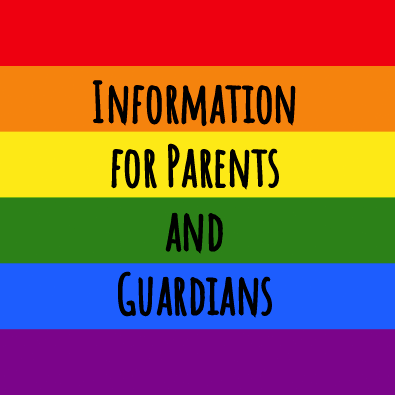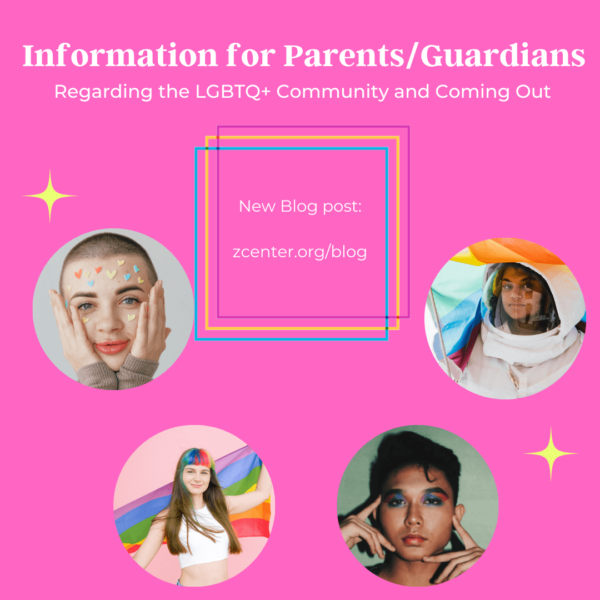 Oftentimes, parents and guardians can feel unsure of what to do and how to respond when their child expresses to them or “comes out” as someone who identifies within the LGBTQ+ community. This list of options is meant to serve as a guide for enabling conversation and growth to those findings themselves in this situation.
Oftentimes, parents and guardians can feel unsure of what to do and how to respond when their child expresses to them or “comes out” as someone who identifies within the LGBTQ+ community. This list of options is meant to serve as a guide for enabling conversation and growth to those findings themselves in this situation.
Prepare to do the work and educate yourself. Perhaps you are fortunate enough to be in a situation where you fully understand what your child is experiencing and know just how to respond and support them. Perhaps you feel as though you know nothing. It is okay to acknowledge to yourself and them that you are not sure what is going to happen next, but now is the time for you to put in the work and educate yourself to the best of your ability. This may include utilizing the internet, seeking support services through a network such as PFLAG, or even seeking advice from a friend who has experienced the same thing if your child is comfortable with you doing so. The important thing is that you are doing this work on behalf of them, and making sure they feel comfortable, safe, and respected is essential as they express this aspect of their identity to you.
Actively listen. Your child is likely more nervous than you are as they initiate this conversation with you. Make sure you give them the space and support to express whatever they may be feeling by coming out. This may be something your child has rehearsed and given plenty of thought to, or it might not be at all. In this moment, as they are sharing things with you, practice active listening so that you are taking in what they are saying to you. This may or may not be the right time for you to ask them questions about this, but you can soak in the information they are giving you so that you hear their needs and can understand what can be done in your position to support them rather than interjecting over them with whatever it is you desire to respond with at that moment. There will be the time to express your own feelings, but make sure you are giving them the floor in this crucial moment first.
Respond intuitively. Your child coming out to you is likely something that is a big deal to them. Make sure you are in check with your body language, facial expressions, thoughts, emotions, and words. Altogether, those can impact your child whether you realize it or not. So stay in tune with these feelings so that you can provide the most welcoming environment for your kid and that they leave the conversation feeling supported.
Don’t focus on yourself. You may want to tell your child about a friend or family member within the LGBTQ+ community that you know, or you may even be in a position where you identify within the LGBTQ+ community and are ready to talk all about your own experiences and give advice. Take a breath and remember: baby steps. Unless your child is actively asking to hear this information, don’t turn the conversation towards yourself because that will only take away from the experience for your child.
Acknowledge that you are there as a resource. Your child might not feel comfortable following up with you consistently on this, and as hard as it is to hear- you are not entitled to updates either. However, what you can do is make sure your child knows you are there to confide in, talk with, and to provide support. After this, the ball is in their court and they can decide what to do. It will not help your child if you pressure them and pester for more details. Instead, that can hurt your relationship in such a crucial moment as your child has just opened up to you.
Don’t pressure them for a backstory or details. To elaborate upon the previous point, know that there are certain things that as a parent or guardian you don’t actually need to know. Perhaps your child feels like they want you to know about how they realized they identified within the LGBTQ+ community, but if they don’t want to share that information that is okay. You should never utilize the power dynamic over your child to force them into giving you information because that can set up extremely unhealthy situations for them in the future. In fact, your child may not even have an answer to the questions you want to ask them- that’s okay and you need to accept that as you care for your child, having all of the information possible does not make you automatically supportive and does not make them feel automatically loved. Rather, the continuous work you do to educate yourself and support them will be what makes your relationship positive.
Acknowledge the feelings and bravery needed to invite others to learn about your identity. This very well could be one of the hardest things your child is facing by coming out to you. Far too often those within the LGBTQ+ community are persecuted for their identity and even kicked out of their homes after coming out to loved ones. Your child may not know how you will react and may be aware of the negative consequences potentially facing them, yet they trust you enough to invite you into this aspect of their life. Respect them for that and know they are so brave to do so. This is not the moment to question your child, but to see how brave they are and to remind them of that.
Approach this as a learning process for your relationship. As mentioned above, prior to this moment you may feel as though you have no knowledge, all of the knowledge, or somewhere in between when it comes to the LGBTQ+ community. It is completely acceptable to let your child know this. Let them know this will be a learning process for you, but that you are determined to do what it takes to learn specifically how to support them.
Know that you cannot compare yourself to other parents and guardians. It is worth mentioning that you may have seen the experiences other parents and guardians have had as they experienced similar situations. There is no one right way to go about this just as there is no one right way to go about parenting in general. Being honest with yourself and your child is what will make the difference for upholding a healthy relationship, so don’t compare yourself to others doing it “perfectly” because at the end of the day what needs to matter to you is your child’s health and safety, which fortunately you can enhance through your love and support.
Know what this means. This is a defining moment in your relationship. Your child may want you to be hands on or not, but as you educate yourself on the terminology and backstory of the LGBTQ+ community, educate yourself on the statistics as well. Acknowledge higher levels of sexual assault, increased suicide rates, and how the likelihood of being a victim of a crime increases for those within the LGBTQ+ community. This information is not meant to be something that scares you, but is meant as something to show how needed your support is. Places like ZCenter are doing the work for outreach and prevention education to end sexual violence, but the battle is ongoing, and in your role as a parent you can be there as a knowledgeable support system for your child to help them be aware of other support systems as well.
This guide is not necessarily foolproof in that you are guaranteed a perfect relationship with your child by following these tips. As any parent knows by now, there is no such thing as a perfect relationship with our children because of so many things that are out of our control. What you can do in this moment however, is control your response and give support so your child feels safe and sees you as the ally you are for them.
Written by Haley Wold, Intern, Lake Forest College
All ZCenter blog posts are written by state certified staff, interns, and volunteers. For questions on authorship or content, please email kjones@zcenter.org.

